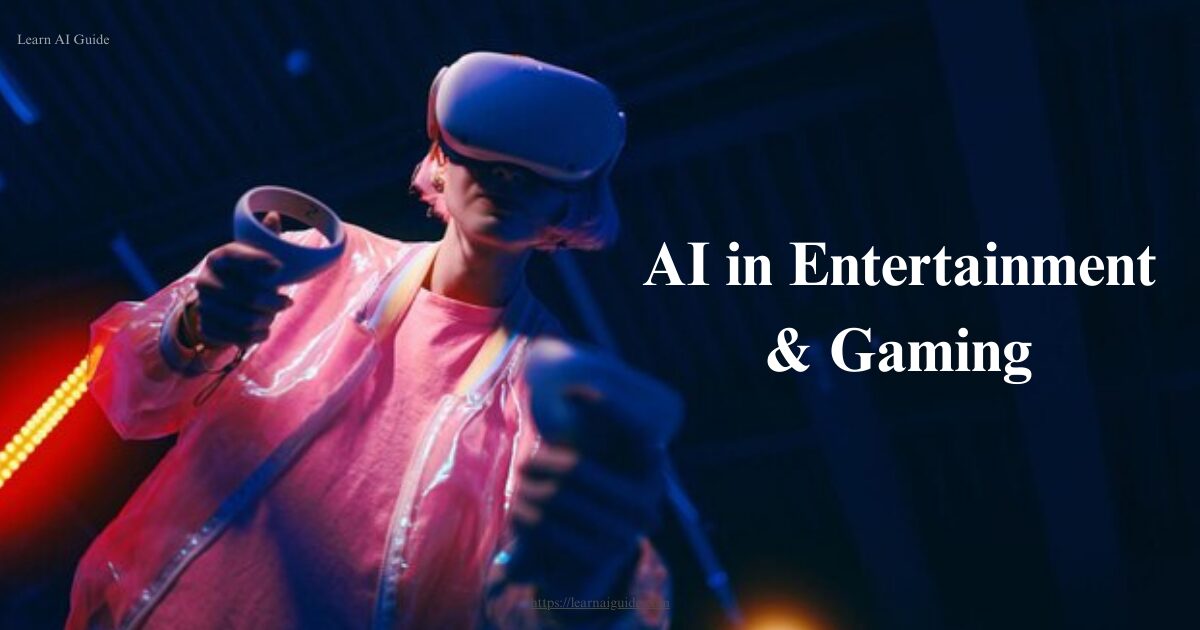AI in Entertainment and Gaming: Revolutionizing User Experience and Creativity
Artificial Intelligence (AI) is transforming the landscape of entertainment and gaming, ushering in a new era of immersive experiences and creative possibilities. From enhancing gameplay dynamics to revolutionizing storytelling, AI’s impact is profound and multifaceted.
This article delves into the role of AI in entertainment and gaming, exploring its current applications, future potentials, advantages, disadvantages, and the ethical considerations that come with its integration.
Evolution of AI in Gaming and Entertainment
AI’s journey in gaming dates back decades, evolving from rudimentary algorithms to sophisticated neural networks capable of learning and adapting in real-time.
Early applications focused on procedural content generation and simple decision-making for non-player characters (NPCs).
Today, AI powers complex gameplay mechanics, dynamic storytelling, and realistic simulations that blur the line between virtual worlds and reality.
Applications of AI in Gaming
AI’s influence spans various aspects of gaming, notably in procedural content generation where algorithms autonomously create vast, unique game worlds like those in Minecraft.
And No Man’s Sky. AI-driven NPCs and characters enhance gameplay by providing more realistic interactions and adapting to player behavior, enriching immersion and challenge levels dynamically.
Adaptive gameplay mechanics utilize AI to adjust difficulty based on player skill, ensuring a balanced experience for both novice and expert gamers.
Moreover, AI facilitates game testing and quality assurance through automated processes, detecting bugs and optimizing performance, thereby improving game stability and user satisfaction.
AI in Entertainment Beyond Gaming
Beyond gaming, AI reshapes entertainment across multiple domains. In film and animation, AI advances enable realistic special effects, digital doubles, and automated animation processes, reducing production time and enhancing visual fidelity.
AI-generated music and sound design personalize auditory experiences in movies and games, adapting seamlessly to user interactions in virtual reality (VR) and augmented reality (AR) environments.
Challenges and Ethical Considerations
However, the integration of AI in entertainment and gaming presents challenges and ethical dilemmas. Privacy concerns arise from AI’s ability to analyze user data for personalized experiences, raising questions about data security and user consent.
Bias in AI algorithms can perpetuate stereotypes and lack inclusivity, affecting representation in media and gaming content.
Technical challenges include the complexity of AI integration, requiring specialized skills and resources.
Scalability and performance issues may limit widespread adoption, impacting the seamless integration of AI-driven features in entertainment platforms.
Future Trends and Innovations
Looking ahead, the future of AI in entertainment and gaming promises continued innovation. AI-powered metaverses could redefine social interactions and virtual economies, offering limitless creative possibilities for developers and users alike.
Advances in deep learning and reinforcement learning will enhance AI’s capabilities. Enabling more sophisticated gameplay mechanics, immersive storytelling, and responsive AI companions in gaming.
Responsible AI in Gaming
Responsible AI practices are crucial in mitigating risks and maximizing benefits. Transparent AI algorithms and ethical guidelines ensure fair gameplay and content creation, fostering trust among users and stakeholders.
Implementing robust data privacy measures and addressing algorithmic bias are essential steps toward creating inclusive and safe digital environments.
Conclusion
In conclusion, AI’s integration in entertainment and gaming represents a transformative shift toward enhanced user experiences and creative innovation. While facing challenges in privacy, bias, and technical complexity.
AI’s potential to revolutionize storytelling, gameplay dynamics, and audio-visual experiences is unparalleled. By embracing responsible AI practices and ethical standards.
The industry can harness AI’s full potential to shape a future where entertainment. And gaming are more immersive, inclusive, and engaging than ever before.
That’s all for today, For more: https://learnaiguide.com/top-7-worlds-most-advanced-ai-systems-2024/
